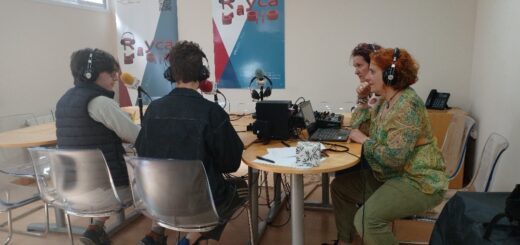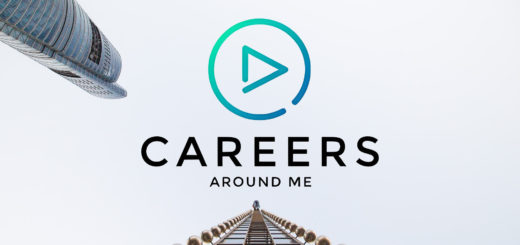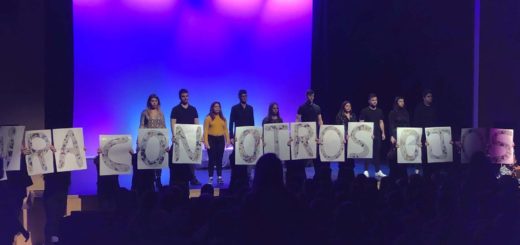Understanding Natural Heritage to Protect Life: A Project Connecting Primary Education and Vocational Training
Within this broader framework, the Global Education research group at the University of Cantabria supports educational innovation processes aimed at rethinking our roles as citizens in a global world facing a deep climate, social, and economic crisis. These processes encourage students (of all ages) to become empowered as agents of social change and transformation.
Creating collaborative networks among professionals from different educational levels can act as a catalyst for educational processes that promote this change, giving students a central role. This has been the case in the experience described here, where Vocational Training (VT) and Primary Education (PE) were brought together with the support of the aforementioned research group.
The Higher-Level Vocational Training Program in Environmental Education (part of the professional family of Safety and Environment) is taught at Secondary School “Foramontanos” in Cabezón de Sal (Cantabria). According to official information from the Cantabrian Government’s Ministry of Education, this training program leads to the qualification of Higher Technician in Environmental. This certification enables graduates to work in public or private organizations focused on environmental control and resource management, the development of environmental education programs, guide-interpreter activities, environmental accompaniment, and environmental management.
Likewise, Foramontanos Secondary School participates in the “Reta Cantabria FP” program. This program aims to promote the development of projects based on active learning methodologies in schools that offer Basic Vocational Training. The project adopts a challenge-based approach, setting goals that help operationalize the curriculum content and place students in professional roles and contexts. In the Environmental Education program, the challenge took shape through the organization of Environmental Education Days, which saw their second edition during the 2024-2025 academic year. These days have established themselves not only as an active, participatory, and engaging classroom methodology, but also as a significant event in the local community calendar.
The event pursued a dual objective: on one hand, to raise awareness at the local level about various environmental issues and about initiatives being developed by different groups (such as livestock farmers, environmental activists, and renewable energy advocates); and on the other hand, to address the need for educational activities aimed at children, to bring them closer to Cantabria’s natural, cultural, and ethnographic heritage.
This second goal opened up collaboration with the Global Education research group at the university, and more specifically, with the transfer project titled Education for Global Citizenship from the Perspective of Children’s Rights, which was developed under the framework of the agreement between the Government of Cantabria and the University of Cantabria.
Within this context, vocational training students began planning various activities for children, specifically targeting 5th grade students at Primary School Elena Quiroga in Santander (Cantabria). The activities were designed to help children discover the heritage of their region, incorporating a gender perspective and a playful, engaging methodology.
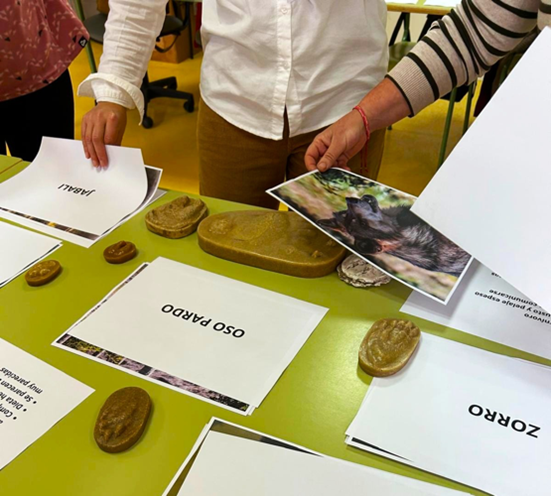
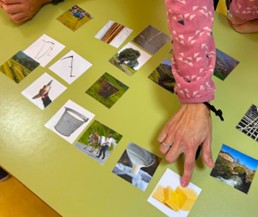
Photo: preparing the activities in the Vocational Training classroom
This joint initiative by the three institutions unfolded over three phases:
Phase 1: Meeting and Recognition.
This phase began with a training session at the university, where the vocational training teacher and the coordinator of the research group explored ways to collaborate, both being familiar with each other’s work and sharing a mutual interest in educational processes that connect the local and the global through active, narrative, and creative methodologies.
Phase 2: Collaborative Design.
While preparing the classroom activities, the need to choose a format to present the content became clear. Options like texts, images, and stories were considered, aiming for a variety of expressive forms. Ultimately, the team decided to use a map of Cantabria, which would be customized during the workshop. The map displayed the different regions of the community, and each would serve as a base for activities focused on various elements of natural or ethnographic heritage: puzzles about Cantabrian wildlife, games on dune formation and erosion, the influence of orography on Cantabrian culture, the traditional work of the “rederas” (net-menders) in San Vicente de la Barquera and its impact on local vocabulary, rural schooling experiences, and more.
In this stage, two members of the research group visited the vocational school, where students presented the activities that were still in development. During this exchange, students explained the meaning, goals, chosen materials, timing, and methodology of the activities, demonstrating their pedagogical reasoning and reflecting on the curricular and organizational decisions made during the design process. This visit helped finalize the structure of the activities, understand how they complemented each other, and address methodological issues related to the children’s age and the school’s context. A key decision was also made to create a supplementary educational resource, to be used either right after the activity or later by the classroom teachers. This encounter helped improve gender mainstreaming, enhance content accessibility, and align the materials more closely with the Primary Education curriculum.
After this visit, the research group introduced the workshop to the 5th-grade teachers at the CEIP through a series of meetings, as the teachers were planning a project on Cantabria for the second semester.
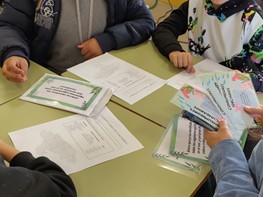
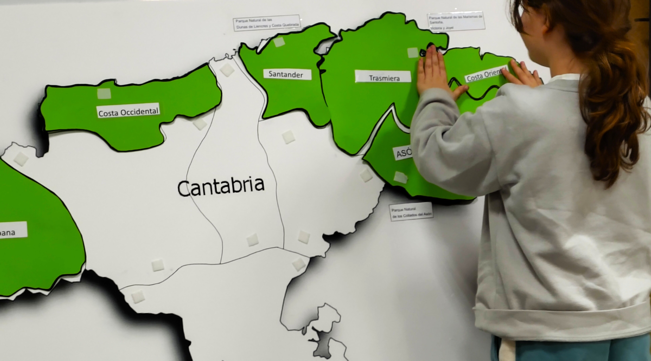
Photo: Workshop development in the Primary Education classroom
Phase 3: Implementation and Evaluation.
As planned, the workshop was carried out simultaneously in two 5th-grade classes at CEIP Elena Quiroga in Santander. The university team, with support from the classroom teachers, documented the sessions with photographs and videos. After the workshop, students worked with the prepared educational material, and their first impressions were collected through recorded reflections. The final evaluation was conducted by two other members of the research group, who developed a set of questions discussed in class assemblies.
The next step for this project should be to continue building alliances among professionals and students at all educational levels, to deepen our understanding of our heritage, to value it, and to protect it, especially in this critical moment in History. As Vandana Shiva reminds us, “the challenge for today’s global policymakers is to learn from mothers, tribal groups, and other communities how to place the well-being of children at the heart of their decisions” (Shiva, 2014, p. 162).
To learn more about our experience:
Environmental Education Days Website:
https://ecaforamontanos2.wixsite.com/ii-jornadas-ambien-1/agenda
Global Education Research Group Website – Researching New Scenarios for Global Citizenship:
https://globaleducation.unican.es/
References:
Valladares, F. (2023). Recivilizing. Challenges, obstacles, and motivations to fix the world. Destino.

Autoras:
Adelina Calvo Salvador and Elia Fernández Díaz (Global Education Group, University of Cantabria)
